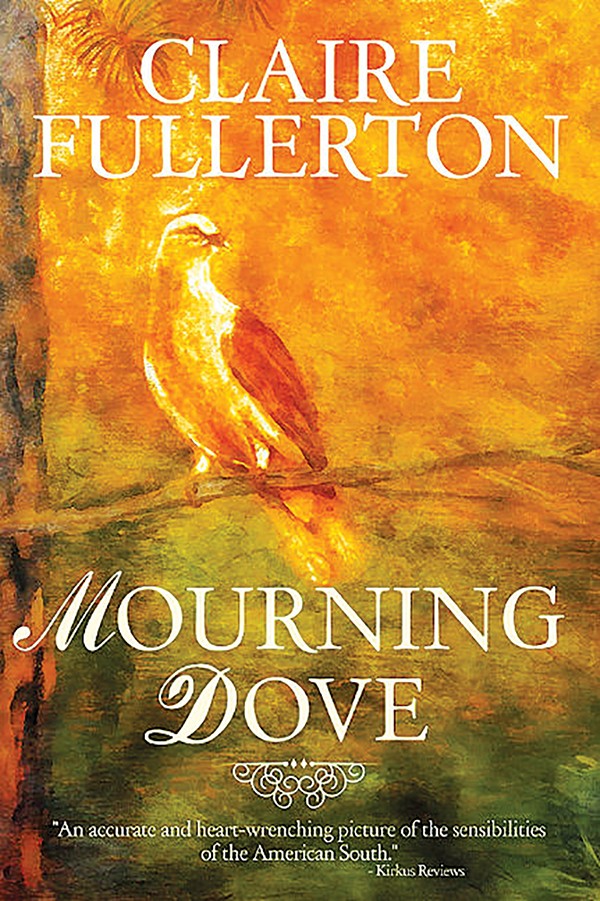One could put together a mighty fine shelf of novels set in Memphis. To name just a few: September, September by Shelby Foote. Good Benito by Alan Lightman. Another Good Lovin’ Blues by Arthur Flowers. The Frozen Rabbi by Steve Stern. Molly Flanagan & the Holy Ghost by Margaret Skinner. A Summons to Memphis by Peter Taylor. The Springs by Anne Goodwin Winslow.
And now we must add to that august shelf this powerful, polished gem, Mourning Dove, by ex-Memphian Claire Fullerton. Fullerton lived here through the ’60s and ’70s, when most of this novel takes place. Her memory is clear and her prose crystalline. This is Memphis rendered nimbly and passionately, a city that encompasses both the landed gentry and the restless younger generation, which sees through — and travels through — the thin veil of gentility that still sits on the sprawling city like a doily on a magnolia stump.

Claire Fullerton lives in California now. But this is a chronicle penned by a shrewd novelist haunted by her hometown, a city of ghosts and lush memories. At times this family novel reminded me of the grandest family novel, Christina Stead’s The Man Who Loved Children. Fullerton’s delineation of her memorable characters is masterful.
The story is predominantly about a brother and sister, Finley and Millie Crossan, and is told first-person through the soft-filter eyes of Millie. She adulates Finley, who, we are told on the first page, has died early. So, this is not just an examination of the peccadillos and mores of the Southern upper crust. It is also a mystery. What happened to the golden boy, a genius in school, an athlete and musician, and a protean soul if ever there was one?
The Crossans relocate from Minnesota to Memphis, escaping from the children’s father, a well-meaning drunk. “The Memphis Finley and I landed in was my mother’s Memphis. It was magnolia-lined and manicured, black-tailed and bow-tied. It glittered in illusory gold and tinkled in sing-song voices.”
Millie grows up during the course of the novel, searching for her true self, one which has to struggle out from under her veneration of Finley and from under her mother’s genteel velvet glove. “At sixteen,” she says, “I was beginning to wrestle with the gnawing impression of what I interpreted as my mother’s superficial world, and it left me conflicted, for I had yet to arrive at the stable ground of my own identity.”
This is the Memphis of the Memphis Country Club, but it’s also the Memphis of the Well and the burgeoning punk music crowd, which draws Finley into its sphere. The children learn to assimilate in both cultures, though Millie says, “People from the neat grid of Memphis society I’d been raised in didn’t test its perimeters.”
One of Fullerton’s strengths — and there are many — is her Fitzgeraldian gift of observation. She gets all the details right. Here is Millie’s description of an adult party and her exclusion from it. “The Austrian crystal chandelier in the card room twinkled like a spotlight on their haute couture, and their voices carried all the way upstairs, to where Finley and I kept out of the way.” This concision, and its nuanced rendering of emotion, is found throughout this remarkable novel.
Mourning Dove is mainly concerned with Finley and how Millie’s view of him fluctuates, though her love never flags. As she gets older, her exalted brother’s diamond-bright personality begins to reflect sides she was unprepared for. As a friend tells her, “Careful of this guy, he leads a double life.” Though the heart sees what it wants to see, Millie begins to cast a gimlet eye on Finley, as he drifts away from her.
I don’t want to diminish how really fine this novel is by characterizing it only as a Memphis novel, though Memphians would be right to want to claim it and hold it dear. As I read it, page after page, I kept thinking, “Jesus, this is truly extraordinary.” Claire Fullerton is the real deal, and my admiration for this book is comparable to my admiration for Eudora Welty — I think Mourning Dove is that good.
Claire Fullerton signs Mourning Dove at Novel on September 11th.